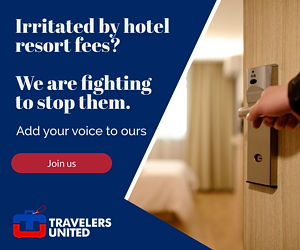A room rate must include mandatory hotel fees to be honest.

False hotel advertising is a shameful and dishonest practice and it must stop. Since 2012, Travelers United has led the fight against resort fees. The advocacy organization worked to goad the Federal Trade Commission (FTC) into protecting consumers from this kind of false advertising.
A decade ago, the consumer advocacy groups got the FTC’s attention. The Commission sent a letter to hotel companies and online travel agencies, but after being shrouded in secrecy for almost four years, the proposed solution still allowed false advertising. Though the Washington Post has reported that our government consumer watchdog is beginning to pivot and demand truth in advertising, the false hotel advertising continues. It has continued for the past six years as the FTC studies the problem.
The initial FTC solution was to require hotels to disclose mandatory hotel fees. However, that still allowed properties to advertise false room rates that distorted the market. The false advertised price was allowed to be $100 a night, but the real price was $130 after the mandatory fees were assessed at checkout. Even online travel agents had to play by the hotels’ deceitful rules.
The market forced honest hotel companies to become dishonest.

Giant companies like Expedia found themselves having to disclose to customers that the total cost for a room was $130; however, they would only collect $100, and at check-out, the hotel would charge another $30 a day. With the FTC’s tacit approval, hotels constructed a system that resulted in growing false advertising.
One of the hotel industry’s defenses is that these hidden, mandatory fees are for the consumers’ good.
That’s why the hotel industry provides guests full disclosure for mandatory resort fees charged up front. Mandatory resort fees were created in an effort to provide consumers with the best value by grouping amenity fees into one cost.
Disclosing that travelers have been lied to does not make it right. Changing the required price after the initial advertising is false advertising.
However, their claims are hollow. Disclosing to consumers that they have to be subjected to false hotel advertising does not make that advertising truthful.
- American Hotel and Lodging Association cannot show one consumer who likes paying for something they do not use.
- They cannot produce one consumer who feels that advertising a room rate of $100 when the real cost is $130 is honest.
- The AHLA does not have a consistent definition of resort fee that includes group amenities consistent across lodging properties. There is no transparency. The AHLA FAQ only states that these fees “commonly cover many items and services.” There is no way at some hotels for consumers to know during the booking process what amenities are included in the mandatory fee.
- The AHLA’s surveys say that “consumers are willing to pay for mandatory resort fees if the amenities are worth it.” If the amenity is not used but charged for, how can it be “worth it”?
The AHLA cannot defend this false hotel advertising practice as anything other than misleading and deceptive marketing that fleeces customers and makes millions for hotels.
Allowing the hotels to continue their false room cost advertising hurts competition.
The next defense mounted by AHLA is that online travel agents also have fees. And, by extension, almost all travel agents have fees. However, mixing a travel agent service or convenience fees with a mandatory hotel-imposed fee is like mixing apples and oranges.
- Consumers want to know the price of a service, such as a hotel. The convenience fees are separate from hotel fees completely controlled by the property.
- Hotel fees are mandatory — they must be paid no matter the payment method. Convenience fees can be avoided by selecting another venue for purchasing.
- Hotel fees are magnitudes greater — the average mandatory hotel fee in the US is about $30 daily. Transaction/convenience fees are rarely more than $20 for an entire transaction for a multi-day hotel stay.
- Only travel agents in the neighborhood and online provide a place to compare prices. This keeps prices lower for consumers.
- Complaints about mandatory hotel fees continue unabated. Convenience/service charges are for online access to everything from sports ticket purchases and major concerts to ATMs, county taxes, and utility bills. Do we like them? No. But mixing these far-flung fees that are ultimately optional with mandatory hotel-imposed fees is wrong.
Less than 7 percent of hotels charge resort fees. The practice is still harmful to consumers.
Another defense of the current false hotel advertising regime is that only 7 percent of hotels nationwide lie about their prices. Yes, this is a real defense repeated by AHLA. These unscrupulous hotels and resorts are the target of continued Travelers United advocacy efforts.
Travelers United strongly supports the latest FTC study that showed not including mandatory hotel-imposed fees in any room rate harms consumers. Modern computer systems allow websites to display room rates, including mandatory taxes as well. This way, consumers will know how much a basic hotel room will cost. If amenities are included, so much the better.
All other optional fees should not be considered a part of the advertised room rate. They are assessed for a separate service, not for the hotel room itself, and all can be avoided.
READ ALSO: What makes false advertising so misleading for travelers
After years of work, State AGs and the Travelers United legal department have filed lawsuits against hotels for misrepresenting total prices.
Currently, there are three lawsuits that the hotel industry is fighting. Any one of these three lawsuits can change the world for travelers in America. When false advertising is eliminated and consumers can comparison shop, Travelers United’s advocacy work will have succeeded when it comes to false advertising.
The longer the FTC excuses this mandatory resort fee conduct, the more it will spread through the industry. The government cannot continue to ignore any breach of truth in advertising rules.


Charlie Leocha is the President of Travelers United. He has been working in Washington, DC, for the past 14 years with Congress, the Department of Transportation, and industry stakeholders on travel issues. He was the first consumer representative to the Advisory Committee for Aviation Consumer Protections appointed by the Secretary of Transportation from 2012 through 2018.



